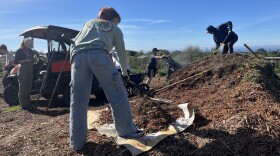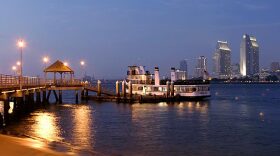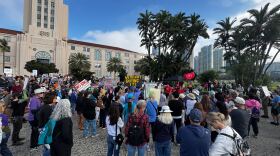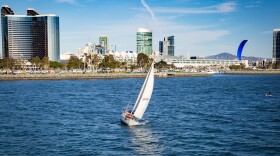Violence in the disputed region of Abyei has killed at least 30 people along Sudan's north-south divide, officials said Monday. Observers fear the latest unrest could spark more fighting amid an otherwise peaceful and jubilant independence referendum in the south.
Abyei remains the most contentious sticking point between north and south following a two-decade civil war that left 2 million dead. Even President Obama, who applauded this week's historic referendum on independence in the south, warned that violence in the Abyei region should cease.
Abyei, which holds oil deposits, had been promised its own self-determination vote, but now whether it remains part of Sudan or joins an independent south will be decided in negotiations that so far have made little progress.
Jubilant voters flooded polling stations for a second day Monday. Turnout was heavy in the southern capital of Juba, with lines running 500 people long Sunday. Peres Juan Ebele had walked for an hour in flip-flops to be among the first at the polls in Kuli Papa, a village of about 600 people an hour's drive outside Juba, Sunday morning. She had a message in English for the government of Northern Sudan: "Bye-bye, bye-bye. All I can say is bye-bye."
Like many Southern Sudanese, Ebele, who is about 40, despises the leaders in the northern capital of Khartoum. She said soldiers from the north had raided her village since before she was born, abducting children and killing husbands and daughters.
Several hours' drive away in the market town of Lainya, hundreds pushed to get into a polling station in the midday heat Sunday. Mogga Jackson, a Baptist preacher in the village of Ganji Payam, said he'd vote for independence because the north has ignored the basic needs — like health care and clean water — of poor villages like his.
"There are no doctors which can come and help us. Water is not available. We have to go to the stream and get water from the stream," he said. A free Southern Sudan will be able to use money from its resources, like oil, to build a new, more prosperous nation — one where southerners can rule themselves and live without fear of the north, he said.
Differing Accounts Of Attack Sunday
Sudanese President Omar al-Bashir has said he will let the oil-rich south secede peacefully, calling the balloting a necessary step to avoid war and make Sudan stronger and better.
But conflicting accounts emerged Monday concerning the latest violence in the region straddling the north-south divide, and both sides accused armed forces of being in Abyei in violation of the peace agreement that ended the 1983-2005 civil war.
Col. Philip Aguer, the spokesman for Southern Sudan's military, said Arabs from the Misseriya tribes and fighters from a former Khartoum-backed militia killed 20 police and wounded 30 more during an attack with anti-tank weapons and artillery in the village of Maker-Adhar on Sunday.
The Misseriya, a nomadic cattle-herding tribe, sometimes cross into Abyei with cattle. Aguer, though, said he believes the attack was planned. "They were not with cattle, they were coming for [an] attack," he said.
Bashtal Mohammed Salem, a tribal leader, meanwhile accused police of killing 10 herders in about the same general area. He also said that southern security forces have increased their presence in Abyei in violation of the agreement.
"They want to keep us out of the area and declare independence unilaterally," he said.
Aguer said the Misseriya were accompanied by uniformed men known as the Popular Defense Forces, a former militia that has been integrated into Sudan's military. There was no immediate comment from the Khartoum-based government on the allegations.
A U.N. official said the southern government has asked for help in evacuating the wounded police. The official was not allowed to be identified because the information hadn't been made public.
The Roles Of Militias
Meetings on Wednesday are to include the interior ministers of the south and north to regulate the presence of police in the area.
Abyei also saw some violence in the days before the independence referendum got under way, though officials from the north and south gave conflicting accounts of the casualties and the locations of the fighting.
Successive Sudanese governments in the north have heavily relied on tribal militias in the peripheries to quell rebellions in the country's south and west, where Darfur is located.
The Sudanese president's regime is accused of unleashing Arab militias known as janjaweed against rebels in the Western Darfur region, which have committed atrocities against ethnic African towns and villages. The U.N. says some 300,000 people have died in Darfur since 2003. The Sudanese government denies backing the janjaweed and says the death figures are inflated.
Al-Bashir is wanted by the International Criminal Court, accused of orchestrating genocide against ethnic Africans in Darfur.
In February 2007, the ICC charged Cabinet Minister Ahmed Haroun, who is currently the governor of Southern Kordofan, near Abyei, with crimes against humanity and war crimes in Darfur. The ICC alleges Haroun coordinated government efforts to arm and fund the janjaweed.
Trying To 'Keep Abyei Calm'
While Abyei has oil, its oil resources are dwindling and two oil fields went to the north after international arbitration. The area is rich with grazing fields and water resources -- and the Misseriya tribe fears it will be denied access to such resources if Abyei joins the south even though tribe members are granted grazing rights under the Abyei protocol.
Barrie Walkley, the top U.S. official in Juba, said Haroun traveled to Abyei on Sunday to meet with the top official in the area. They signed an agreement pledging to address the conflicts between the two sides, Walkley said Monday.

The agreement "represents an important step to try to keep Abyei calm and to make sure that these small clashes don't escalate," Walkley said.
The south's army suspects Haroun is now arming militias near Abyei. Aguer, the southern military spokesman, accused Haroun of "doing the same thing he did in Darfur. He's the master minder of the whole situation."
Voting For 'Separation' Or 'Unity'
Southerners, who mainly define themselves as African, have long resented their underdevelopment, accusing the northern Arab-dominated government in Khartoum of taking their oil revenues without investing in the south.
Southern Sudan is among the world's poorest regions. The entire France-sized region has only 30 miles of paved roads. Because only 15 percent of southern Sudan's 8.7 million people can read, the ballot choices were as simple as could be: a drawing of a single hand marked "separation" and another of clasped hands marked "unity."
Independence won't be finalized until July, and many issues are yet to be worked out. They include north-south oil rights, water rights to the White Nile, border demarcation and the status of the contested region of Abyei, a north-south border region where the biggest threat of a return to conflict exists.
Most of Sudan's oil is in the south, while the pipelines to the sea run through the north, tying the two regions together economically. Officials from both Khartoum and the south therefore recognize that should partition happen, the two countries will have to have a close working relationship. With the oil reserves dwindling and the economy weighing heavily on the minds of most Sudanese, officials on both sides are tasked with finding ways to reduce debt and find alternative exports.
With reporting from NPR's Frank Langfitt in Juba, NPR's Soraya Sarhaddi Nelson in Khartoum and material from The Associated Press.
Copyright 2022 NPR. To see more, visit https://www.npr.org. 9(MDAzMjM2NDYzMDEyMzc1Njk5NjAxNzY3OQ001))






